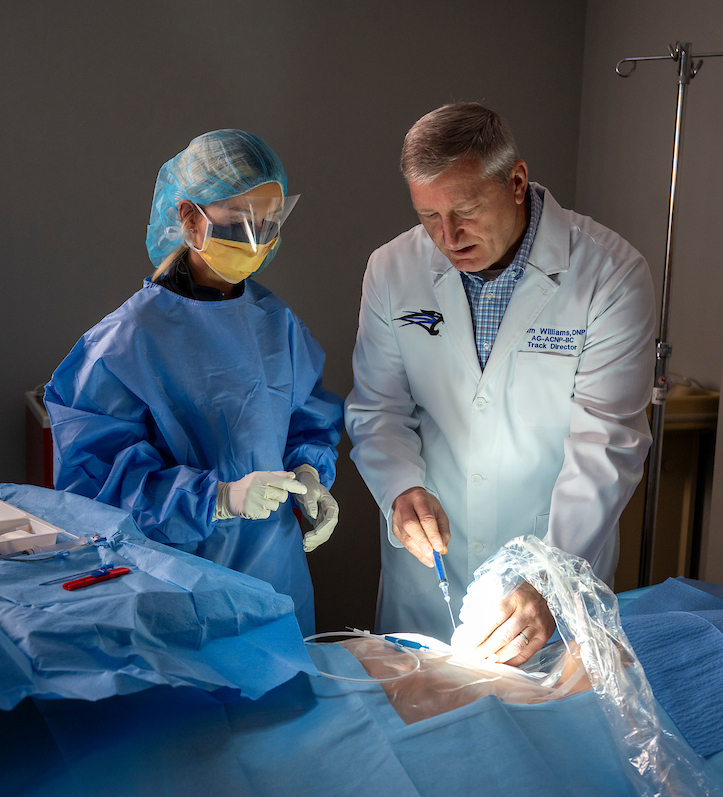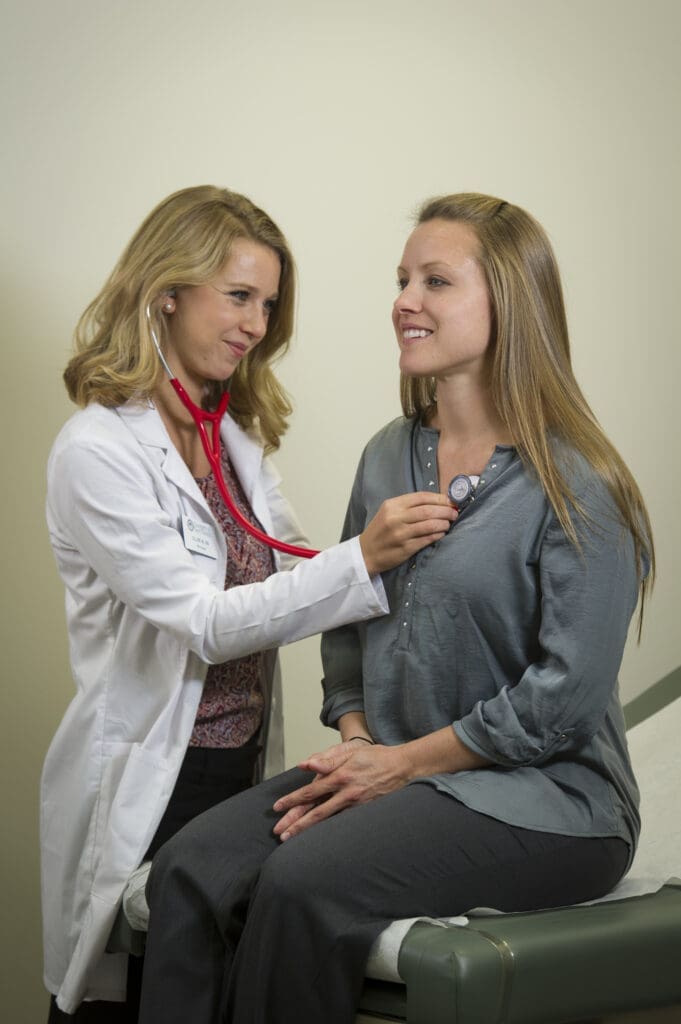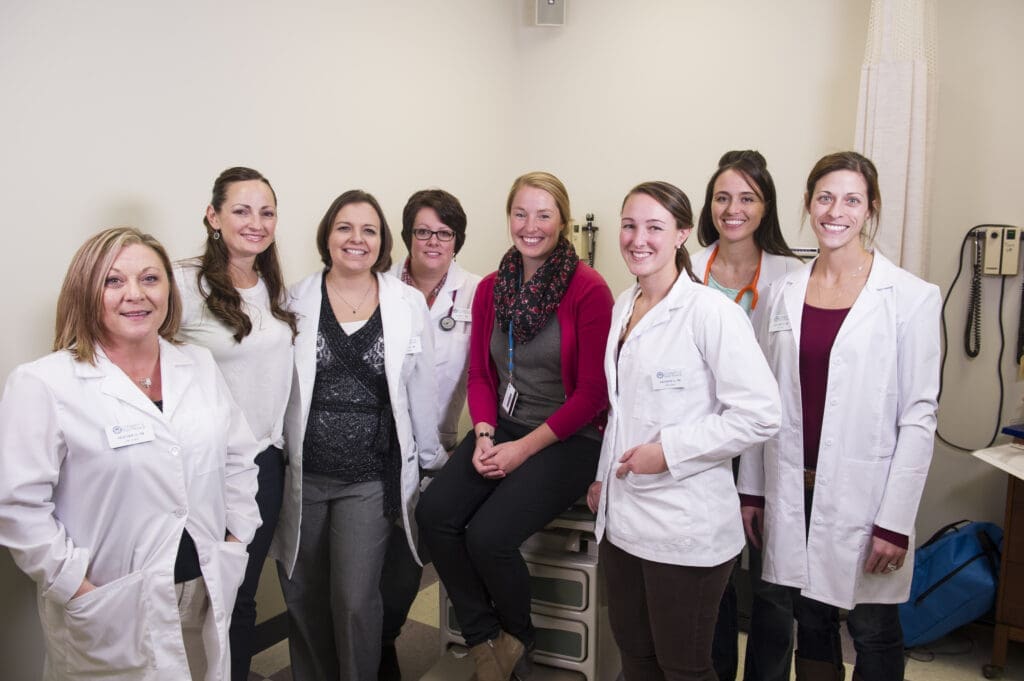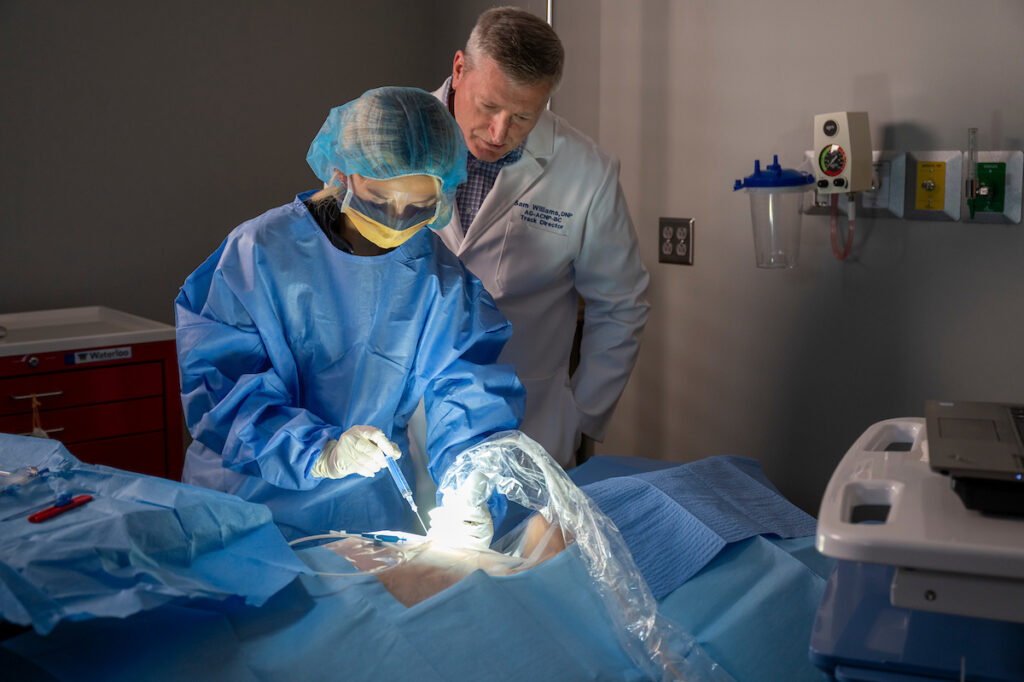Nursing (DNP)
Take your passion for nursing to the next level and move into advanced care. A DNP (terminal degree in nursing) allows you to expand your scope of practice and lead the future of healthcare.
- Degrees/Options
- Doctor of Nursing Practice
Pathways for all level RNs - Length
- Program length varies
Hybrid format
Attend full or part time - Locations
- Fort Wayne
- Available Concentrations
- Family Nurse Practitioner (FNP); Psychiatric-Mental Health Nurse Practitioner (FMHNP); Adult-Gerontology Acute Care Nurse Practitioner (AGACNP); Leadership Track

Why Earn a DNP for Advanced Practice Registered Nursing?
A DNP is considered the gold standard in education for today’s advanced practice registered nurses. Professional organizations, including the American Association of Colleges of Nursing (AACN) and the National Organization of Nurse Practitioner Faculties (NONPF), recommend that a DNP be the required degree for APRNs.
As the healthcare industry works through this anticipated transition, many clinical and leadership roles in nursing that previously required a master’s degree now prefer a doctorate.
Skills for an In-Demand Field
Advanced practice registered nurses are in high demand. The Bureau of Labor Statistics cites it as the second fastest growing profession in the nation. Employment is expected to grow 45% between 2022 and 2032 with more than 29,000 positions per year.
The DNP prepares professionals to make complex nursing and leadership decisions. As a student in our program, you will develop into a versatile and strategic healthcare professional with expertise in:
- Practice management
- Risk management
- Outcomes measurement
- Patient advocacy
- Health information
- Research and scholarship
Prepare to Lead in Nursing
DNP-prepared APRNs are positioned to meet the needs and complexities of the growing healthcare system—as practitioners devoted to patient care, executive leaders who guide healthcare teams and educators preparing the next generation of professionals.
Increased Earnings
DNP-prepared APRNs typically earn a higher salary than their master’s-level counterparts. Payscale reports a $9,000 difference between DNP- and MSN-prepared nurses
100%
Career success rate for our DNP graduates
$121,610
Median annual salary for nurse practitioners
BLS.gov
45%
Projected increase in employment opportunities for nurse practitioners through 2032 (much faster than average for all occupations)
BLS.gov
Why Saint Francis for Your DNP?
Our Franciscan values and the Nursing Code of Ethics have a lot in common. When you pursue your DNP at Saint Francis, you’ll not only gain top-level skills and knowledge, but you’ll develop into a healthcare professional who reveres the dignity of each patient, respects all creation and is dedicated to serving others.
Strong Reputation
Our DNP program builds upon a long history of outstanding nursing education. The most respected healthcare organizations in the region trust Saint Francis graduates to be well-prepared and ready to serve. The university’s strong reputation, quality education and flexible hybrid format make it an ideal program for working nurses across the Midwest and beyond.
Flexible Structure and Schedule
Saint Francis’ DNP program was created specifically for working nurses, with a flexible hybrid format. “Intensives” bring students and faculty together twice a semester for in-person learning which includes lectures, group work, simulations, patient visits and more. The rest of the semester involves flexible synchronous and asynchronous online learning.
Excellent First-Time Exam Pass Rates
Graduates of our DNP program have a 100% pass rate on board certification exams through the American Nurses Credentialing Center (ANCC) and the American Association of Nurse Practitioners (AANP).



DNP Concentrations
Our DNP program offers four in-demand options:
Family Nurse Practitioner (FNP)
Family nurse practitioners focus on providing primary care services to patients of all ages, with special emphasis on patient education, disease prevention and health promotion. With the increasing shortage of primary care physicians—especially in rural areas with underserved populations—FNPs fill an essential gap in primary care and are in high demand.
Psychiatric-Mental Health Nurse Practitioner (PMHNP)
Psychiatric-mental health nurse practitioners provide compassionate, quality mental health services for patients across the lifespan. PMHNPs are specifically trained to assess, diagnose and treat patients with substance use disorders, behavioral issues and other psychiatric disorders. Psychiatric-mental health nurse practitioners are in high demand throughout the nation. The Health Resources and Services Administration lists all Indiana counties as high-need.
Adult-Gerontology Acute Care Nurse Practitioner (AGACNP)
Adult-gerontology acute care nurse practitioners focus on care and treatment of adult and gerontology patients, with a specialization in acute and critical illness, injury and chronic disease conditions. AGACNPs evaluate patients; order and interpret diagnostic tests; diagnose injuries, illnesses and diseases; perform invasive procedures; and develop care plans in collaboration with attending physicians. AGACNPs are employed in a variety of in-patient and hospital settings, including the ER and ICU.
Leadership Track
This track is for nurses who do not wish to pursue a certificate as an advanced practice registered nurse. The leadership track allows students to take courses from the university’s MBA, MHA and Master of Arts in Teaching programs to prepare them for a career in leadership and management.

“My experience at Saint Francis (USF) elevated my nursing career. It prepared me to function at a high professional level in a specific area of expertise. I loved my experience there.”
Morgan Stuut, DNP ’22 CRNA at Saint Joseph Reginal Medical Center
DNP Pathways
No matter where you are in your nursing career, Saint Francis has a path for you to earn your Doctorate of Nursing Practice.
Post ADN to DNP
Nurses with associate degrees start with a 2-semester transition sequence. These courses deliver essential BSN content and are designed to help students succeed in the DNP portion. Options include:
- Post ADN to DNP Family Nurse Practitioner
- Post ADN to DNP Psychiatric-Mental Health Nurse Practitioner
- Post ADN to DNP Adult-Gerontology Acute Care Nurse Practitioners
- Post ADN to DNP Leadership
Post BSN to DNP
BSN-level nurses take advanced courses in pharmacology, pathophysiology, health assessment, population health and more before selecting one of the following concentrations and completing specialized courses and projects:
- Post BSN to DNP Family Nurse Practitioner
- Post BSN to DNP Psychiatric-Mental Health Nurse Practitioner
- Post BSN to DNP Adult-Gerontology Acute Care Nurse Practitioners
- Post BSN to DNP Leadership
Post MSN to DNP
This track is for students holding a master of science in nursing. Course work includes advanced classes in Health Ethics and Spiritual Care, Policy and Advocacy, Epidemiology, Informatics and more:
- Post MSN to DNP Family Nurse Practitioner
- Post MSN to DNP Psychiatric-Mental Health Nurse Practitioner
- Post MSN to DNP Adult-Gerontology Acute Care Nurse Practitioners
- Post MSN to DNP Leadership


APRN Career Opportunities
Once you’ve passed your APRN certification exam, you can work as a registered nurse practitioner in a wide range of healthcare settings, from hospitals and specialty clinics to outpatient and community centers.
Additionally, your prior nursing experience coupled with a DNP degree can open you up to other career opportunities, including:
- Chief nursing officer
- Director of nursing
- Nursing administrator
- Nursing educator
- Program director
- Healthcare consultant
DNP Careers: Where You’ll Find Our Graduates
Saint Francis graduates work as advanced practice registered nurses and in other clinical and administrative nursing positions at a variety of locations, including:
- Adams Health Network
- Beaufort Memorial Hospital
- Bowen Center
- Clean Recovery Centers
- Illinois Department of Corrections
- Indiana University Health
- Manchester University
- Methodist Hospitals
- Northeast Internal Medicine Association
- Parkview Health
- St. Vincent Health
- University of Saint Francis
- U.S. Navy Reserve
Accreditor-Commission on Collegiate Nursing Education
The Doctor of Nursing Practice program and/or post-graduate APRN certificate programs at University of Saint Francis is accredited by the Commission on Collegiate Nursing Education, 655 K Street NW, Suite 750, Washington, DC 20001, 202-887-6791.
- Original Date of Accreditation: 2019
- Date of Most Recent Review: 2019
- Results of Most Recent Accreditation Review: Initial accreditation was granted for 5 years in 2019.
- Date of Next Review: 2024